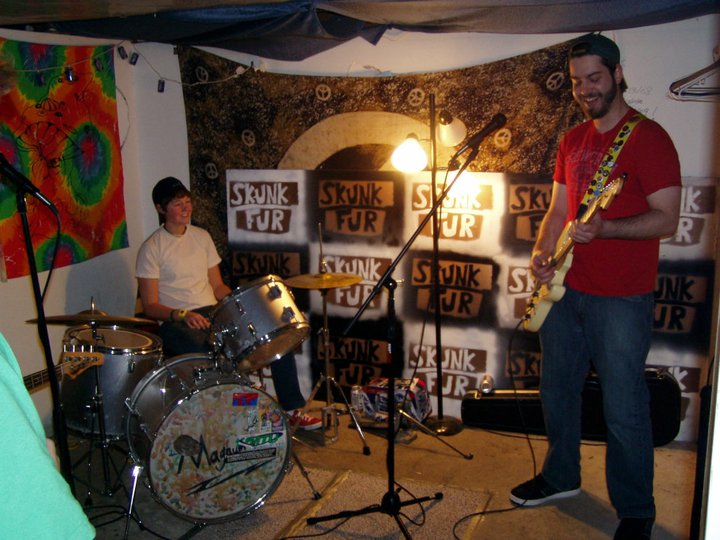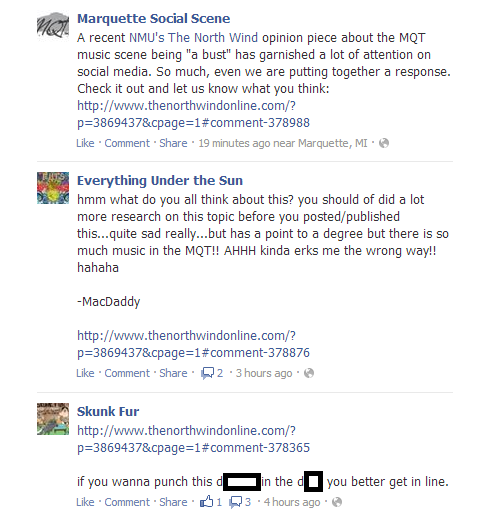By Brice Burge
Managing Editor
An opinion piece in Northern Michigan University's student newspaper the North Wind received a number of retweets, shares and comments this last week, claiming that the music scene in MQT was a "bust."
The response from those in the music scene were typically angry, critical and disappointed.
Managing Editor
An opinion piece in Northern Michigan University's student newspaper the North Wind received a number of retweets, shares and comments this last week, claiming that the music scene in MQT was a "bust."
The response from those in the music scene were typically angry, critical and disappointed.
The piece written by Luke Londo name dropped a lot, blaming Double Trouble DJ's recent success and the closure of the Upfront & Co. as contributing factors into the recession of MQT's music scene. Consistent derogatory remarks were made against Flanigan's Bar as well as the quality of patrons at the Verabar and Wild Rover.
What upset me was the selective nature of these jabs. Double Trouble is named in the article, but other spinners like GrooveMQT, DJ Seismic and Lake Effect Entertainment that strengthen the electronic/house music scene of MQT are not mentioned. Flanigan's DJ's -- as well as their live bands and outdoor venue during the summer months -- were downgraded to nothing more than a "karaoke machine." There is no mention of Blues Fest, the Hiawatha Music Festival or the Marquette Symphony Orchestra, which cut out the cultural side of MQT's music scene.
As the piece reached its viral peak, I had a chance to talk to some professionals in the music scene, including musicians, DJ's, venue owners and bar managers. All were highly critical of the piece, specifically the operating costs of bringing in a national or regional act to MQT. Londo briefly addresses the business side of the issue in the third-to-last paragraph.
Unfortunately for everyone, there are tinges of truth in the piece. The bar scene has started to get into a rut of acoustic, open mic-driven weekdays with the same local bands and DJ's on the weekends. Bands don't have to go from bar to bar anymore to gather a following, with some listeners even opting out of hearing their favorite band if they don't like the venue. Outside of a major festival, when was the last time you remember hearing an opening act?
What is most unfortunate is that this really disrespects the talent and culture of music in MQT. There are so many talented musicians across multiple disciplines that deserve to be heard. While the marketing may not be there yet to get people excited about a specific band, rarely are people upset about having live music or the homegrown electronic options.
So if there are definite issues compromising MQT's music scene, how do they get fixed? From the discussions, the social media reactions and Londo's piece itself, problems like finances, lack of large venues and lack of communication is hurting the area.
Bands cost money to have and more money than DJ's. This means that whether they are locally based or brought in from all across the country, there needs to be funds available to pay them. If there is no cover charge, bars only get money if you buy their product, and I'm not talking about the two cokes you bought while you and a friend take up valuable bar real estate. The better the sales are during a band, the more excited the bar is to bring them back.
This also means that venue owners have to be willing to pay more for better bands while bands have to realize they may not make the same amount of money at each venue. Bars should also keep better records of what sales are before, during and after each show. This allows for incentive-based agreements and bonuses, which will make deals more attractive to both sides.
Collaboration is an underutilized role in making shows happen. Exploiting some of the connections in MQT already like the Blue Lounge/Ron's Tacos, Ore Dock/Aubree's or Flanigan's/Butchie Boys-Toarminas is a great way for businesses to get advertising while venues get more money to pay for better bands. Collaboration also increase the amount of people that hear about the shows, which will generate more interest.
Venues are a little harder to fix. The only large venue with alcohol that closes at 2 a.m. is the Verabar, which rarely hosts a band.
While larger acts will be an issue, fixing venue stereotypes for local bands will be a great start. I encourage every venue owner to book one band that your establishment wouldn't typically host, whether the act is brand new or a house party band or has a different kind of sound compared to what you usually have. Here's the catch for the bands: it is your responsibility to bring in your fans to that location.
Having both the talent and the venue make the first move will help generate good faith in MQT's music scene. To encourage this, MQT Social Scene is guaranteeing coverage of these venues and bands that are breaking up the status quo.
An article here or there isn't a lot, but this website's goal is to make MQT better while providing as many opportunities as possible. Increasing coverage to the people trying to help MQT break out of a rut is the least we can do. If fans of the music scene would like to help us write articles, take pictures or review albums, we would love to add you to the team.
This piece from Londo and the North Wind blamed a lot of people, but was a rude awakening to what happens when a scene can get complacent. Now that the problems are identified, let's go out and fix it together.
Brice Burge is the Managing Editor of MQT Social Scene. He can be reached at [email protected].
What upset me was the selective nature of these jabs. Double Trouble is named in the article, but other spinners like GrooveMQT, DJ Seismic and Lake Effect Entertainment that strengthen the electronic/house music scene of MQT are not mentioned. Flanigan's DJ's -- as well as their live bands and outdoor venue during the summer months -- were downgraded to nothing more than a "karaoke machine." There is no mention of Blues Fest, the Hiawatha Music Festival or the Marquette Symphony Orchestra, which cut out the cultural side of MQT's music scene.
As the piece reached its viral peak, I had a chance to talk to some professionals in the music scene, including musicians, DJ's, venue owners and bar managers. All were highly critical of the piece, specifically the operating costs of bringing in a national or regional act to MQT. Londo briefly addresses the business side of the issue in the third-to-last paragraph.
Unfortunately for everyone, there are tinges of truth in the piece. The bar scene has started to get into a rut of acoustic, open mic-driven weekdays with the same local bands and DJ's on the weekends. Bands don't have to go from bar to bar anymore to gather a following, with some listeners even opting out of hearing their favorite band if they don't like the venue. Outside of a major festival, when was the last time you remember hearing an opening act?
What is most unfortunate is that this really disrespects the talent and culture of music in MQT. There are so many talented musicians across multiple disciplines that deserve to be heard. While the marketing may not be there yet to get people excited about a specific band, rarely are people upset about having live music or the homegrown electronic options.
So if there are definite issues compromising MQT's music scene, how do they get fixed? From the discussions, the social media reactions and Londo's piece itself, problems like finances, lack of large venues and lack of communication is hurting the area.
Bands cost money to have and more money than DJ's. This means that whether they are locally based or brought in from all across the country, there needs to be funds available to pay them. If there is no cover charge, bars only get money if you buy their product, and I'm not talking about the two cokes you bought while you and a friend take up valuable bar real estate. The better the sales are during a band, the more excited the bar is to bring them back.
This also means that venue owners have to be willing to pay more for better bands while bands have to realize they may not make the same amount of money at each venue. Bars should also keep better records of what sales are before, during and after each show. This allows for incentive-based agreements and bonuses, which will make deals more attractive to both sides.
Collaboration is an underutilized role in making shows happen. Exploiting some of the connections in MQT already like the Blue Lounge/Ron's Tacos, Ore Dock/Aubree's or Flanigan's/Butchie Boys-Toarminas is a great way for businesses to get advertising while venues get more money to pay for better bands. Collaboration also increase the amount of people that hear about the shows, which will generate more interest.
Venues are a little harder to fix. The only large venue with alcohol that closes at 2 a.m. is the Verabar, which rarely hosts a band.
While larger acts will be an issue, fixing venue stereotypes for local bands will be a great start. I encourage every venue owner to book one band that your establishment wouldn't typically host, whether the act is brand new or a house party band or has a different kind of sound compared to what you usually have. Here's the catch for the bands: it is your responsibility to bring in your fans to that location.
Having both the talent and the venue make the first move will help generate good faith in MQT's music scene. To encourage this, MQT Social Scene is guaranteeing coverage of these venues and bands that are breaking up the status quo.
An article here or there isn't a lot, but this website's goal is to make MQT better while providing as many opportunities as possible. Increasing coverage to the people trying to help MQT break out of a rut is the least we can do. If fans of the music scene would like to help us write articles, take pictures or review albums, we would love to add you to the team.
This piece from Londo and the North Wind blamed a lot of people, but was a rude awakening to what happens when a scene can get complacent. Now that the problems are identified, let's go out and fix it together.
Brice Burge is the Managing Editor of MQT Social Scene. He can be reached at [email protected].
Read more | about us Follow MQT Social Scene on Facebook and Twitter. MQT Social Scene is looking for writers, photographers and graphic artists for internships. For more information, contact us. |



 RSS Feed
RSS Feed
